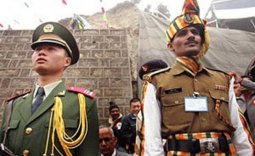Beijing, Jul 18: India should not use "trespass" into the Doklam area in the Sikkim sector as a "policy tool" to achieve its "political targets", China said today, asking New Delhi to immediately withdraw its troops to avoid any escalation.
The foreign ministry also said it was in "close communication" with foreign missions in Beijing on the standoff with India, but refused to confirm whether it held a special briefing for them on the issue.
"Since the illegal trespass by Indian border personnel, many foreign diplomats in China felt shocked about this and (wanted) to confirm whether it was true," the ministry's spokesman Lu Kang said when asked about the reported briefing.
"The Chinese side maintains close communication with the foreign diplomatic missions on the issues they are interested," Kang told reporters.
China reportedly held a "closed-door briefing" last week and conveyed their side of the story on the standoff near the Bhutan trijunction. The standoff between Indian and Chinese armies have continued for a month over the construction of a road by China near the trijunction.
India has expressed concern over the road construction near the trijunction, fearing it may allow Chinese troops to cut India's access to its northeastern states. It has conveyed to China that the road construction would represent a significant change of status quo with serious security implications for India.
Asked if China stated in the reported meeting that its patience was withering, Lu said Beijing stressed that the "facts are very clear in this incident".
He said the Sikkim section of the India-China boundary is mutually recognised by the two sides. "This time Indian border personnel illegally trespassed the boundary into the Chinese territory," he said. "We stress that the Indian side should not take the trespass as a policy tool to reach or realise their political targets," he said.
To another question whether Beijing has stated that patience was running out over the issue, he said: "We have reiterated our position on the illegal trespass by the Indian side."
"You must be very clear about it. We hope the Indian side can get clear understanding of the current situation and take immediate measures to withdraw the personnel who have illegally crossed the boundary so as to avoid the escalation," he said.
Earlier an Op-ed in a Chinese state-run daily said that if India "stirs up conflicts in several spots, it must face the consequence of an all-out confrontation with China along the entire LAC (Line of Actual Control)."
"China doesn't advocate and tries hard to avoid a military clash with India, but China doesn't fear going to war to safeguard sovereignty either, and will make itself ready for a long-term confrontation, said The Global Times.





Comments
Add new comment